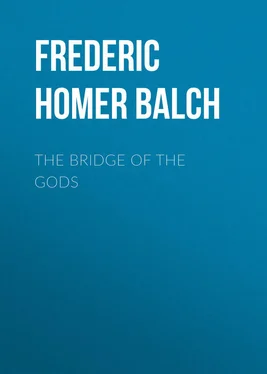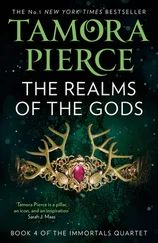Frederic Balch - The Bridge of the Gods
Здесь есть возможность читать онлайн «Frederic Balch - The Bridge of the Gods» — ознакомительный отрывок электронной книги совершенно бесплатно, а после прочтения отрывка купить полную версию. В некоторых случаях можно слушать аудио, скачать через торрент в формате fb2 и присутствует краткое содержание. ISBN: , Жанр: foreign_antique, foreign_prose, на английском языке. Описание произведения, (предисловие) а так же отзывы посетителей доступны на портале библиотеки ЛибКат.
- Название:The Bridge of the Gods
- Автор:
- Жанр:
- Год:неизвестен
- ISBN:http://www.gutenberg.org/ebooks/28815
- Рейтинг книги:3 / 5. Голосов: 1
-
Избранное:Добавить в избранное
- Отзывы:
-
Ваша оценка:
- 60
- 1
- 2
- 3
- 4
- 5
The Bridge of the Gods: краткое содержание, описание и аннотация
Предлагаем к чтению аннотацию, описание, краткое содержание или предисловие (зависит от того, что написал сам автор книги «The Bridge of the Gods»). Если вы не нашли необходимую информацию о книге — напишите в комментариях, мы постараемся отыскать её.
The Bridge of the Gods — читать онлайн ознакомительный отрывок
Ниже представлен текст книги, разбитый по страницам. Система сохранения места последней прочитанной страницы, позволяет с удобством читать онлайн бесплатно книгу «The Bridge of the Gods», без необходимости каждый раз заново искать на чём Вы остановились. Поставьте закладку, и сможете в любой момент перейти на страницу, на которой закончили чтение.
Интервал:
Закладка:
“She is getting better, she is coming out of her sufferings,” he whispered to the doctor.
“She will be out of her sufferings very soon,” he replied sadly; and then Cecil knew that the end was at hand. Was it because the peace, the profound serenity which sometimes is the prelude of death, filling her being, penetrated his, that he grew so strangely calm? An inexpressible solemnity came to him as he looked at her, and all his agitation left him.
Her face grew very sweet and calm, and full of peace. Her eyes met Cecil’s, and there was in them something that seemed to thank him for all his goodness and patience, – something that was both benediction and farewell. Her lips moved, but she was past the power of speech, and only her eyes thanked him in a tender, grateful glance.
The sun’s edge flashed above the horizon, and its first rays fell through the uncurtained window full upon her face. She turned toward them, smiling faintly, and her face grew tenderly, radiantly beautiful, as if on that beam of sunshine the spirit of her dead lover had come to greet her from the sea. Then the sparkle died out of her eyes and the smile faded from her lips. It was only a white, dead face that lay there bathed in golden light.
A moment after, Cecil left the house with swift footsteps and plunged into the adjacent wood. There under a spreading oak he flung himself prone upon the earth, and buried his face in his hands. A seething turmoil of thoughts swept his mind. The past rose before him like a panorama. All his married life rushed back upon him, and every memory was regret and accusation.
“I might have been kinder to her, I might have been better,” he murmured, while the hot tears gushed from his eyes. “I might have been so much better to her,” he repeated over and over, – he, whose whole thought had been to shut up his sorrow in his own heart and show her only tenderness and consideration.
By and by he grew calmer and sat up, leaning against the tree and looking out into vacancy with dim eyes that saw nothing. His heart was desolate, emptied of everything. What was he to do? What was he to set before himself? He had not loved her, but still she had been a part of his life; with what was he to fill it now?
As he sat there depressed and troubled, a strange thing happened.
He was looking, as has been said, blindly into vacancy. It may have been an optical illusion, it may have been a mere vagary born of an over-wrought brain; but a picture formed before him. In the distance, toward the west, he saw something that looked like a great arch of stone, a natural bridge, rugged with crags and dark with pine. Beneath it swept a wide blue river, and on it wild horsemen were crossing and recrossing, with plumed hair and rude lances. Their faces were Indian, yet of a type different from any he had ever seen. The bridge was in the heart of a mighty mountain-range. On either side rose sharp and lofty peaks, their sides worn by the action of water in some remote age.
These details he noted as in a dream; then the strangeness of it all burst upon him. Even as it did so, the vision dissolved; the bridge wavered and passed away, the mountain-peaks sank in shadow. He leaped to his feet and gazed eagerly. A fine mist seemed passing before his sight; then he saw only the reach of hill and woodland, with the morning light resting upon it.
While the vision faded, he felt springing up within him an irrepressible desire to follow it. A mysterious fascination seized him, a wild desire to seek the phantom bridge. His whole being was swayed as by a supernatural power toward the west whence the vision had passed. He started forward eagerly, then checked himself in bewilderment. What could it mean?
In the nineteenth century, one similarly affected would think it meant a fevered, a disordered brain; but in the seventeenth, when statesmen like Cromwell believed in dreams and omens, and roués like Monmouth carried charms in their pockets, these things were differently regarded.
The Puritan ministry, whose minds were imbued with the gloomy supernaturalism of the Old Testament on which they fed, were especially men to whom anything resembling an apparition had a prophetic significance. And Cecil Grey, though liberal beyond most New England clergymen, was liable by the keenness of his susceptibilities and the extreme sensitiveness of his organization to be influenced by such delusions, – if delusions they be. So he stood awed and trembling, questioning within himself, like some seer to whom a dark and uncertain revelation has been made.
Suddenly the answer came.
“The Lord hath revealed his will unto me and shown me the path wherein I am to walk,” he murmured in a hushed and stricken tone. “Ruth was taken from me that I might be free to go where he should send me. The vision of the Indians and the bridge which faded into the west, and the strange desire that was given me to follow it, show that the Lord has another work for me to do. And when I find the land of the bridge and of the wild people I saw upon it, then will I find the mission that God has given me to do. ‘Lord God of Israel, I thank Thee. Thou hast shown me the way, and I will walk in it, though all its stones be fire and its end be death.’”
He stood a moment with bowed head, communing with his God. Then he returned to his lonely home.
The friends whose kindly sympathies had brought them to the house of mourning wondered at the erect carriage, the rapt, exalted manner of the man. His face was pale, almost as pale as that within the darkened room; but his eyes shone, and his lips were closely, resolutely set.
A little while, and that determined face was all sorrowful and pitying again, as he bent over the still, cold body of his dead.
CHAPTER IV
THE COUNCIL OF ORDINATION
Friends were assembled together; the Elder and Magistrate also
Graced the scene with their presence, and stood like the Law and the Gospel…
After the Puritan way and the laudable custom of Holland.
A few days after the funeral, letters missive from the little society went out to all the neighboring churches, calling a council to ordain the Reverend Cecil Grey a missionary to the Indians.
It was a novel thing, in spite of the noble example that Roger Williams had set not many years before; and the summons met with a general response.
All the churches, far and near, sent delegates. If one could only have taken a peep, the day before the council, into the households of that part of New England, what a glimpse he would have gotten of Puritan domestic life! What a brushing up there was of black coats, what a careful starching and ironing of bands; and above all, in Cecil’s own neighborhood, what a mighty cookery for the ordination dinner the next day! For verily the capacity of the clerical stomach is marvellous, and is in fact the one thing in theology that does not change. New departures alter doctrines, creeds are modified, but the appetite of the clergy is not subject to such mutations.
The morrow came, and with it the expected guests. The meeting house was crowded. There were many ministers and lay delegates in the council. In the chair sat a venerable preacher, not unknown in the records of those days, – a portly man, with a shrewd and kindly face. Sterner faces were there also. The council wore a grave aspect, more like a court of judges before whom a criminal is cited to appear than an assembly of clergymen about to ordain a missionary.
After some preliminaries, Cecil was called on to give a statement of his reasons for wishing to go as an evangelist to the Indians. He rose before them. There was a singular contrast between his slight form and expressive features and the stout frames and grim countenances of the others. But the graceful presence of the man had in it a quiet dignity that commanded the respect of all.
Читать дальшеИнтервал:
Закладка:
Похожие книги на «The Bridge of the Gods»
Представляем Вашему вниманию похожие книги на «The Bridge of the Gods» списком для выбора. Мы отобрали схожую по названию и смыслу литературу в надежде предоставить читателям больше вариантов отыскать новые, интересные, ещё непрочитанные произведения.
Обсуждение, отзывы о книге «The Bridge of the Gods» и просто собственные мнения читателей. Оставьте ваши комментарии, напишите, что Вы думаете о произведении, его смысле или главных героях. Укажите что конкретно понравилось, а что нет, и почему Вы так считаете.












